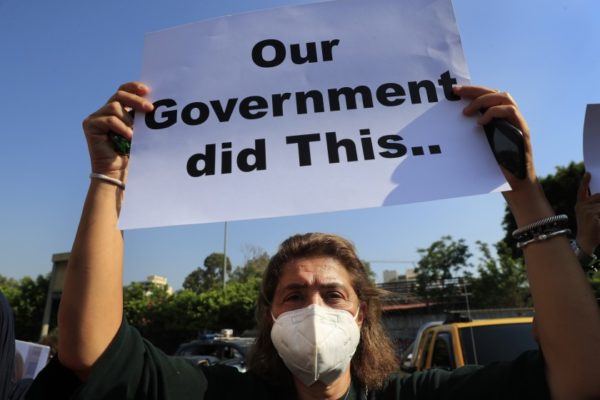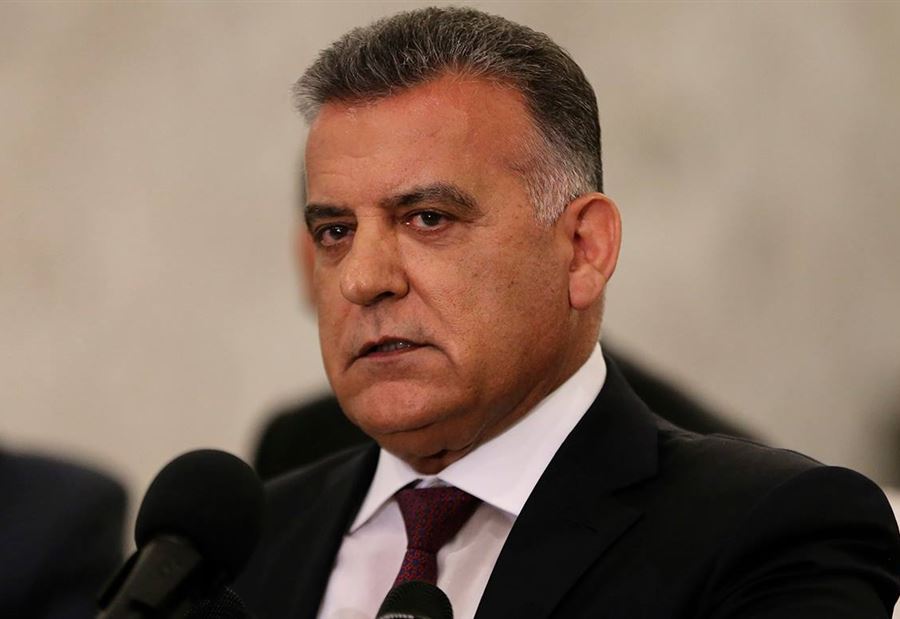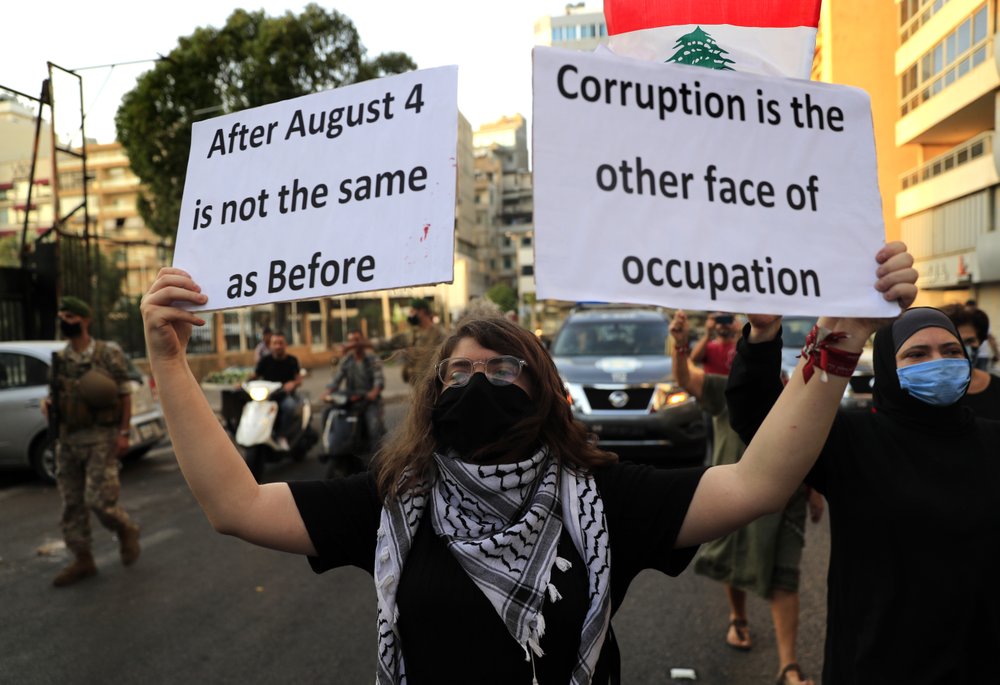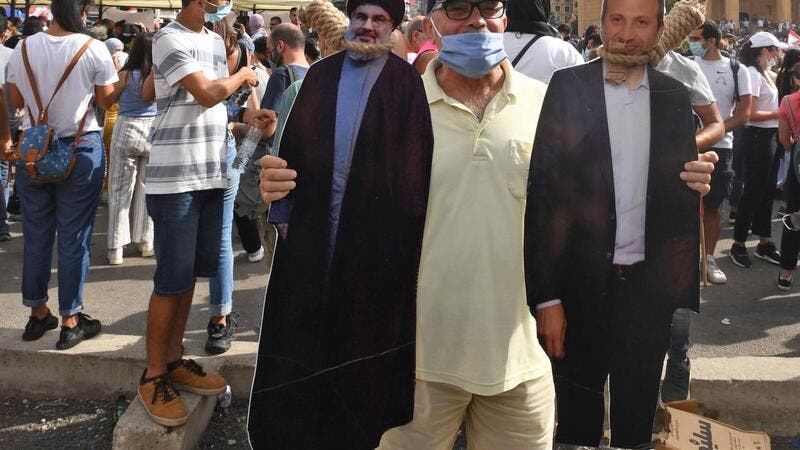The response to the explosion in August 2020 has been marked by chaos and paralysis in what is now a failed state
By Martin Chulov

At ground zero of Lebanon’s apocalypse a stench of dead rats seeps from hulking piles of rotting grain. Broken silos teeter above, their sides ripped apart by the catastrophic blast that also broke the soul of Beirut; the contents that should have fed a nation still lie spilt over the gaping ruins of its main port.
A year ago this week, one of the planet’s gravest industrial accidents caused one of its biggest ever explosions, shattering a city that was already at a tipping point. The mushroom cloud of chemicals that soared above the Lebanese capital on 4 August 2020 and the seismic force of the shock wave that ravaged its homes and businesses were carried around the world in high-definition horror. Even amid the chaos of a country that had allowed this to happen to its people, this was surely a moment of reckoning.
However, on the eve of the disaster’s first anniversary, Lebanon remains paralysed and anguished. The investigation into the blast has flatlined, and its perpetrators are as far away from accountability as ever. Even worse, for most Lebanese, the global aid pledged in the wake of the destruction remains forsaken by the country’s rulers, who prefer the narrow privileges that flowed to them from a crippled system to a global rescue plan that could save the country.

“Who would have thought our begging bowl would be so big and so empty,” said Nidal Osman, a Tripoli building supplier. “The world must be laughing at us. They wanted to give money, and they instead received a palm in their face. While they laugh, we cry.”
In return for up to $11bn in aid dollars, France demanded structural reforms to governance, and transparency at all levels of spending. Billions more from Europe has been conditioned on an audit of the opaque central bank, which has been critical to the movement of Lebanon’s wealth.
In the year since Beirut began picking up the pieces, the Lebanese currency has plunged 15-fold in value. Hyperinflation has put staple foods out of reach of much of its population. Vital medicines can no longer be found – on Friday a four-year-old girl died from a scorpion sting because anti-venom was out of stock. And there is not enough fuel to supply the undergunned electricity sector, or the private generator mafia that plugs the gap, charging exorbitant prices to do so.

Instead of giving birth to an era of redemption, the explosion has come to define the utter dysfunction of a state that has failed for all intents and purposes. Its political class remains unable to form a government, still bickering over the allocation of ministries as prizes to bolster their fiefdoms. State institutions, likewise, are subservient to dug-in factions. This country’s central bank reserves have dipped below mandatory requirements, meaning an imminent end to subsidies in place to safeguard even the middle classes. Lebanese have joined Syrians and other of the region’s forsaken peoples in taking to the Mediterranean on rafts to flee their conditions, no matter the risk. And there is no solution except for a vast international bailout that would mean severing a system that has prevailed for 30 years since the end of the civil war.
As the sheer scale of Lebanon’s meltdown continues to be absorbed by its people, some are starting to confront an unpalatable view that the state’s very foundations were flawed at each of its incarnations. From the Ottoman empire to French mandate, Syrian tutelage, the ravages of the civil war and then the rentier system that followed the 1991 Taif accords which ended the conflict, Lebanon has never had an easy run. But the past three decades in particular have laid the groundwork for its demise.
“After Taif, [the warlords] got consolation prizes, instead of being punished for keeping the war going as long as they did,” said Nora Boustany, a lecturer in journalism at the American University of Beirut, who covered the conflict and aftermath. “They went to town. It was a bonanza for them. The Syrians knew it was happening and they wanted a piece of the action as well. To keep the peace, there was an accommodation with justice. This created a culture of impunity, and this became the norm.
“Rafic Hariri steamrolled ahead with reconstruction,” said Boustany of the former prime minister who presided over Lebanon’s postwar rebuild, accumulating a vast fortune along the way. Saudi Arabia and Syria were central to Lebanon’s reconstruction, setting up patronage networks and spheres of influence that took decisive stakes in the country’s affairs, while at the same time giving patrons a free rein to corral fortunes.
“There was a wealth, a largesse and an ostentatious living that was brought to Beirut,” she said. “This rubbed off on his circle. The accommodation was to let this happen to keep the peace. They all kept their snout in the trough. They partitioned off aid and money from the big funds, and they just kept stealing. There was so much money for institution-building and barely any of it went there.”
Last week, Lebanon named the country’s richest man, Nijab Mikati, a two-time prime minister and resident of its poorest city, Tripoli, as its designated leader and tasked him with forming a government. For the previous 12 months, Saad Hariri, another former leader and son of the slain Rafic Hariri, had been unable to do so – his various cabinet lineups rejected by the country’s president, Michel Aoun. Hariri, a product of the system – and a beneficiary of it until his fortunes turned – had been tasked by France with breaking it. His other former patron, Saudi Arabia, had abandoned him in 2017 for ceding political power to Hezbollah, which ever since has cemented its influence with the cover of Aoun.
“What is happening now is the clash between two projects, two ideas,” said Khaldoun Charif, a veteran Tripoli-based analyst on Lebanese affairs. “People need to understand that corruption is the system here. It was enshrined as such during the implementation of Taif in 1991. Everyone got gifts to get under way. It was the era of largesse. Everyone started stealing money and they were encouraged to do so. There was no chance of a normal state as envisaged now, given the system put in place back then.
“Every business – electricity, water, garbage collection, reconstruction – it all cost the Lebanese people far more than it should have because giant cuts were being paid to the political players. And now they recognise corruption? What changed? Hezbollah became the most powerful player in the country.”

On some days, before the blazing heat of summer starts to bite, port workers collect the dead rats from the grain silos, tossing them into the bay below. “It’s just that they smell so bad,” said Abu Haitham, a junior officer in one of the security services. The symbolism of the rodents piled at the blast site is not lost on Abu Haitham, nor other Lebanese scarred by the betrayal of a state that has never truly served them and seems unlikely to do so now.
“If now isn’t the moment to change, then when is?” asked Yarr Hadid, 24, a student, who, like her siblings, wants to leave for Belgium. “Are we to accept that this is how it is in Lebanon? If the regional actors and the Europeans agreed to the state being built like this, they either have to really help to dismantle it and build again or be honest about the fact that we’re doomed.”
(The Guardian)

Leave a Reply
You must be logged in to post a comment.